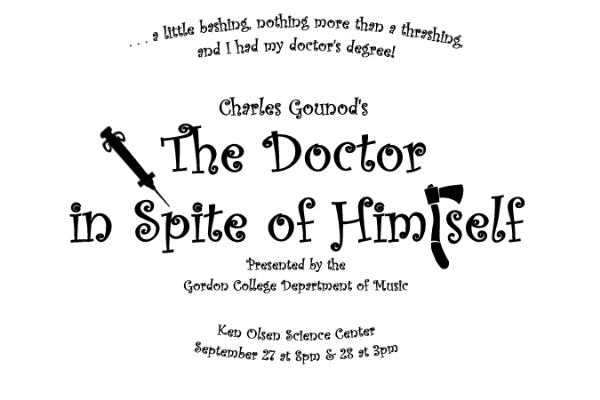First, let's get the big joke out of the way. Yes, I created a new performing edition of Gounod's The Doctor in Spite of Himself in, as they say, partial fulfillment of the requirements for the Degree of Doctor of Musical Arts, a fulfillment which had been a long time coming. You could even say it seemed for awhile as if I'd never finish. You could even say it allowed me to become...wait for it... a doctor in spite of myself. In fact, I was just thinking how, in the story, a lumberjack is beaten into admitting (pretending) that he is a medical doctor, and he then impresses a gullible crowd by spouting off a bunch of nonsensical latin. Much like I was once beaten by the experience of taking comps (analyzing Babbitt, for heaven's sake) and then found my inner professor by throwing out lots of big words in front of gullible students - words like ricercare, fauxbordon, dodecaphonic, and Babbitt.
Anyway, as my story goes, I'd been letting the all-but-dissertation years fly by uneventfully, and the department chair under whom I was adjunct-ing was getting concerned. One day, he suggested that I take a look at the Gounod, which he'd conducted many years before in a somewhat mangled edition titled The Frantic Physician. His idea was that I prepare a reduced orchestration. (I've since learned that the rental score for The Frantic Physician demanded larger forces than Gounod's original.) As I looked through a couple of 19th-century piano-vocal scores, I decided that a new English translation would be useful as well. (I'll cover the whole rationale for singing in translation in another post.)
My source for the orchestration turned out to be Gounod's own 600-page manuscript, which is housed (physically and virtually) in Yale's rare book collection. I quickly learned that Gounod's orchestration is not unwieldy, but it still made sense for our small music department context to use a smaller ensemble. I also learned that Bärenreiter is preparing an authoritative critical edition of the score, so there wasn't much point in me trying to do the same thing. Basically, I reduced doubled woodwinds (2 flutes, 2 oboes, 2 clarinets, 2 bassoons) to single woodwinds and eliminated the horns, which mostly provide harmonic support. This also makes it practical to use a smaller string section. Thus, it's not a particularly drastic reworking of the original, but it can easily be realized by an ensemble less than half the size, which has advantages both for small music department budgets and for young singers not used to projecting over a big orchestra.
Obviously, preparing the new score was fairly time-intensive, but the task of translating the French libretto into English proved to be the most creative and rewarding aspect of the project. I'll write in more detail about the translation in a post to come, but the big challenge was to match the rhymed and metered French of all the musical numbers with rhymed and metered English. Of course, the English needs to be singable and tell the same story in fundamentally the same way. And, above all, it needs to stand on its own as something worth singing and listening to. I'm pleased with most of the solutions I came up with, and I learned a lot about the remarkable richness and flexibility of language.
But enough about me. In upcoming posts, I'll be writing more about the work itself, the story, the standout musical numbers, the translation, etc., while exploring such interesting questions as, "What does this comic opera have in common with the world of the Three Stooges and the Marx Brothers?" And, don't forget, we'll be slowly unveiling all the big tunes in karaoke versions. Hopefully, by the time opening night arrives, we'll have a whole audience just dying to sing along. A new tune debuts on Monday.
[If you're interested in learning more about this edition, email MMmusing at gmail dot com ]
Friday, August 8, 2008
Subscribe to:
Post Comments (Atom)



No comments:
Post a Comment